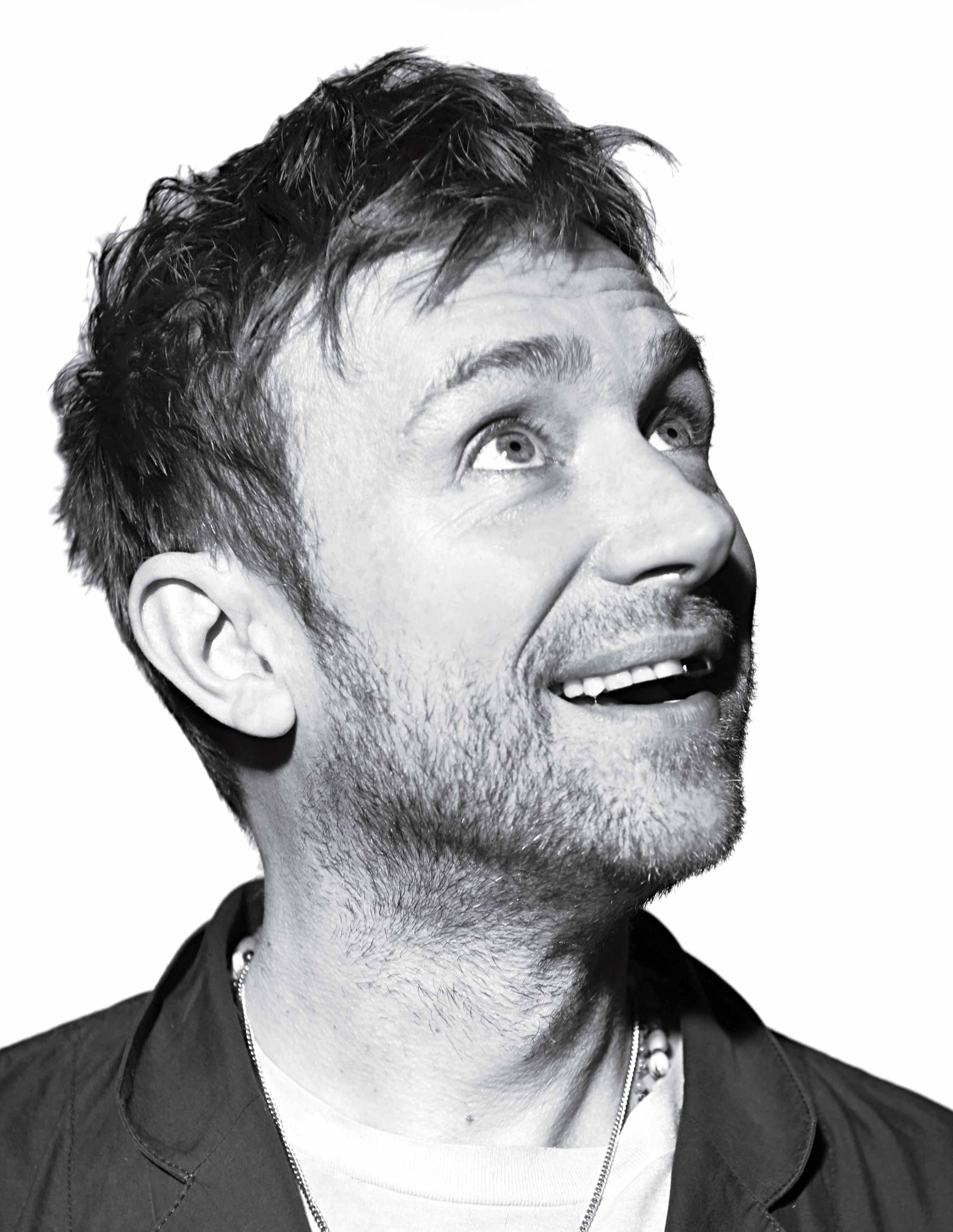
Damon Albarn is at a rare loss, unable to recall the name of a band he was in a few years back. It’s understandable, given that the 46-year-old British rocker has spent the past 25 years playing in an ever changing lineup of groups and collaborations, including Britpop icons Blur in the 1990s; the animated, dub-influenced virtual band Gorillaz in the aughts; and a multimedia opera, Monkey: Journey to the West, inspired by a 16th century Chinese novel, which had its U.S. debut at Lincoln Center last year.
“What’s that other band I was in?” Albarn asks on a recent afternoon, letting the words linger in midflight. He’s trying to recall a one-off trio–you know, the one with the Red Hot Chili Peppers’ bassist Flea and Nigerian drummer Tony Allen? “Ah, yes!” he declares. “Rocket Juice & the Moon!” He lets out a nervous laugh. “Hey, I’ve got a lot going on!”
That he does. Albarn remains consumed by his kaleidoscopic musical endeavors, which are almost compulsive in their variety: collaborations in Mali and Ethiopia with native musicians; production work on soul legend Bobby Womack’s 2012 comeback album; an in-the-works bossa nova track for this summer’s World Cup. And most recently, in April, the release of his weighty debut solo album, Everyday Robots, for which he hits the road this summer on a 24-date global tour, including stops at festivals such as New York’s Governors Ball, Bonnaroo in Tennessee and Denmark’s Roskilde, with nightly set lists drawn from his brilliantly mystifying voyage of a career.
“Productivity can stop,” Albarn offers as his principal motivation. “So I’m going to use every second that I’ve got of musical juice. And when it stops, I will hopefully take it gracefully. Until then, I’ll try to keep getting up in the morning and going to work.”
Albarn is speaking from his West London studio, having logged another eight-hour shift, a weekday custom when he’s home. He picked up this workmanlike approach from his parents, who were originally farmers. “I like that sort of discipline,” he says. “You have to be up and work, and then later you finish.”
For Everyday Robots, Albarn journeyed to an isolated seaside home in Devon. Veteran producer Richard Russell, a longtime friend, urged Albarn to use his own life as a mirror ball of inspiration. As the leader of Blur, Albarn had lampooned contemporary Britain over buzzy guitar riffs. In his latest work, he shifts his focus inward. Amid lilting strings, tugging piano and soft electronic flourishes, the singer revisits a childhood in East London’s Leytonstone (he recently returned there for inspiration), the paranoia and confusion of his mid-’90s peak celebrity and the hazy heroin fog of the following decade. (“Tinfoil and a lighter, the ship across/ Five days on, two days off,” he sings in one of the album’s most revealing–and heavily dissected–lyrics.) The personal subject matter of his songs, Albarn says, weaves “like a river … to the present.”
Albarn, who has a teenage daughter with his longtime girlfriend Suzi Winstanley, the British painter, speaks of his soul-baring turn with great sincerity. As an artist, he has always projected a certain emotional acuity, but he also credits what he refers to as a recent “innate understanding that my life isn’t much different from anyone else’s. I felt [the album] had to be 100% about my life. And if I’m going to be a songwriter, that’s an honest kind of way to go about my trade.”
This openness is central to Albarn’s continued creative streak, Russell says. “Damon has not cut himself off from everyday life,” says the producer. “Damon is a people’s artist. He’s super approachable, and he’s around, and I think that one of the reasons his music continues to be good is because he’s not in a world of bullsh-t, of meaningless celebrity crap. He’s in a world of musicmaking.”
His fellow musicmakers have always responded to his inventiveness. “As far as I’m concerned, he is a genius,” says drummer Allen, who helped pioneer the Afrobeat genre with Fela Kuti several decades before collaborating with Albarn on, among other projects, 2007’s The Good, the Bad & the Queen with the Clash’s Paul Simonon. “He’s the kind of person I’m always looking to work with. Always moving.”
After recently reuniting with Blur for a final tour–“A band in a way can only take you so far,” he says. “Inevitably musicians will go their different ways”–Albarn is optimistic about his forthcoming outing. He’ll be joined by a cadre of the collaborators he’s accumulated on his musical odyssey, a reflection of his desire to keep experimenting.
“It’s fantastic,” he says, “because at some point I’ll be able to turn around and say, ‘I want to play this song,’ and really intuitively gauge the mood of an audience, which is something that I love. Just that sense of everyone together onstage … allowing the evening to sort of evolve without too much planning. That’s my dream.”
More Must-Reads from TIME
- Cybersecurity Experts Are Sounding the Alarm on DOGE
- Meet the 2025 Women of the Year
- The Harsh Truth About Disability Inclusion
- Why Do More Young Adults Have Cancer?
- Colman Domingo Leads With Radical Love
- How to Get Better at Doing Things Alone
- Michelle Zauner Stares Down the Darkness
Contact us at letters@time.com